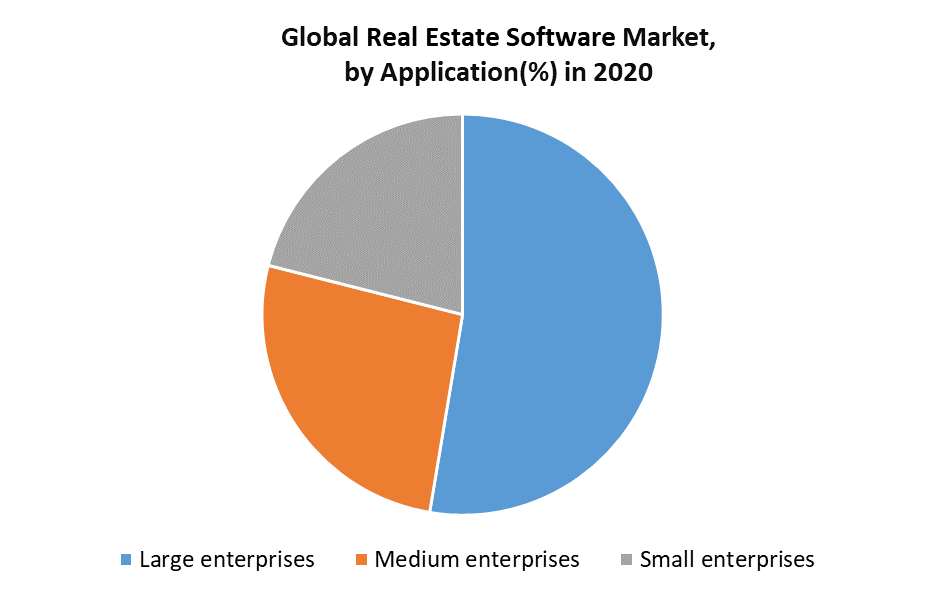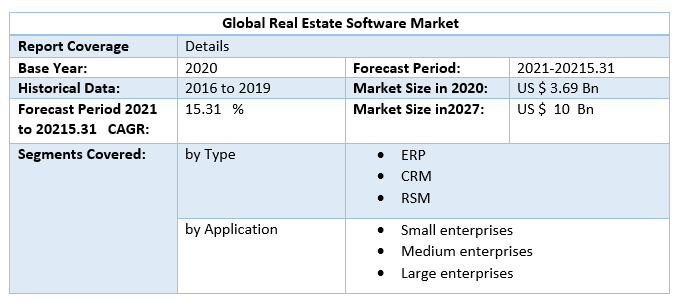Global Real Estate Software Market was worth US$ 3.69 Bn. in 2020 and total revenue is expected to grow at a rate of 15.31 % CAGR from 2021 to2027, reaching almost US$ 10 Bn. in 2027
 To know about the Research Methodology :- Request Free Sample Report 2020 is considered as a base year to forecast the market from 2021 to 2027. 2020’s market size is estimated on real numbers and outputs of the key players and major players across the globe. Past five years trends are considered while forecasting the market through 2027. 2020 is a year of exception and analyzed specially with the impact of lockdown by region.
To know about the Research Methodology :- Request Free Sample Report 2020 is considered as a base year to forecast the market from 2021 to 2027. 2020’s market size is estimated on real numbers and outputs of the key players and major players across the globe. Past five years trends are considered while forecasting the market through 2027. 2020 is a year of exception and analyzed specially with the impact of lockdown by region.
 All of these factors combine to fuel strong demand for real estate software in the residential sector, which is expected to increase at a CAGR of 7.5 % from 2021 to 2026. Opening multiple retail stores around the world also necessitates a suitable understanding of certain property and lease buildings, as well as property management services and solutions that successfully help the target clients through superior ERP and data analytics. The commercial market segment will be driven by this.
All of these factors combine to fuel strong demand for real estate software in the residential sector, which is expected to increase at a CAGR of 7.5 % from 2021 to 2026. Opening multiple retail stores around the world also necessitates a suitable understanding of certain property and lease buildings, as well as property management services and solutions that successfully help the target clients through superior ERP and data analytics. The commercial market segment will be driven by this.
 Objective of the report is to present a comprehensive analysis of the Global Real Estate Software market to the stakeholders in the industry. The past and current status of the industry with the forecasted market size and trends are presented in the report with the analysis of complicated data in simple language. The report covers all the aspects of the industry with a dedicated study of key players that include market leaders, followers, and new entrants. PORTER, PESTEL analysis with the potential impact of micro-economic factors of the market has been presented in the report. External as well as internal factors that are supposed to affect the business positively or negatively have been analyzed, which will give a clear futuristic view of the industry to the decision-makers. The report also helps in understanding the Global market dynamics, structure by analyzing the market segments and project the Global Real Estate Software market size. Clear representation of competitive analysis of key players by Product, price, financial position, Product portfolio, growth strategies, and regional presence in the Global Real Estate Software market make the report investor’s guide
Objective of the report is to present a comprehensive analysis of the Global Real Estate Software market to the stakeholders in the industry. The past and current status of the industry with the forecasted market size and trends are presented in the report with the analysis of complicated data in simple language. The report covers all the aspects of the industry with a dedicated study of key players that include market leaders, followers, and new entrants. PORTER, PESTEL analysis with the potential impact of micro-economic factors of the market has been presented in the report. External as well as internal factors that are supposed to affect the business positively or negatively have been analyzed, which will give a clear futuristic view of the industry to the decision-makers. The report also helps in understanding the Global market dynamics, structure by analyzing the market segments and project the Global Real Estate Software market size. Clear representation of competitive analysis of key players by Product, price, financial position, Product portfolio, growth strategies, and regional presence in the Global Real Estate Software market make the report investor’s guide

Global Real Estate Software Market Overview:
Real estate software aids real estate companies in their day-to-day operations and processes. Real estate software includes tools such as expense tracking, Customer Relationship Management (CRM), Enterprise Resource Planning (ERP), Property Management, Lead generation software, video editing, open house management software, and other tools that help streamline listing and transaction management. To know about the Research Methodology :- Request Free Sample Report 2020 is considered as a base year to forecast the market from 2021 to 2027. 2020’s market size is estimated on real numbers and outputs of the key players and major players across the globe. Past five years trends are considered while forecasting the market through 2027. 2020 is a year of exception and analyzed specially with the impact of lockdown by region.
To know about the Research Methodology :- Request Free Sample Report 2020 is considered as a base year to forecast the market from 2021 to 2027. 2020’s market size is estimated on real numbers and outputs of the key players and major players across the globe. Past five years trends are considered while forecasting the market through 2027. 2020 is a year of exception and analyzed specially with the impact of lockdown by region.
Global Real Estate Software Market Dynamics:
The demand for real estate software has been increasing as a result of its potential to improve business productivity standards, resulting in significant market growth. Because the real estate industry must engage in so many different sectors, such as websites, online advertising, social media, and so on, there is a greater demand for effective real estate management solutions. Furthermore, due to the increase in the number of clients and requirements, manually generating and keeping individual accounts for each work area becomes time demanding, causing major adoption of real estate software by organizations, thus improving company productivity standards. Real estate software is becoming increasingly popular because it allows real estate organizations to manage their websites more easily and efficiently, altering property-related information with a single command. Because organizational structure is so important in enhancing a company's productivity, using such software aids in high-performance management and the speedier preparation of daily reports. Such aspects assist employees in avoiding duplication of effort, arranging meetings and inspections, and a variety of other tasks, all of which optimize operational workflows across the firm. Rising technology advancements have been a primary driving force behind the expansion of the real estate software market. With the rise in demand for modern technologies such as artificial intelligence, cloud computing, and others, the real estate industry has shifted its focus to the development of smart houses in order to enhance its profits. Trulia, a U.S.-based online real estate marketplace, uses AI-based personalization to assist consumers to speed their house searches by recognizing customer preferences and proposing properties. As artificial intelligence (AI) becomes more prevalent in the real estate industry, demand for real estate software is increasing. One of the key challenges to the expansion of the real estate software sector is a high investment. Because of its capacity to increase workflow productivity inside the company through ERP, CRM, and lead generating software, such software has seen increased demand as a result of rising demand for the real estate business. Firms must invest in training workers to operate such complex software in order to avoid long-term customer satisfaction difficulties. Furthermore, the prices of this software are incremental, meaning that as the number of users grows, and it becomes more expensive.Global Real Estate Software Market Segment Analysis:
Global Real Estate Software Market can be sub-segmented into Type, Application and Geography. Based on Application, the market is sub-segmented into Small enterprises, Medium enterprises, and large enterprises. Real estate software that facilitates associated task tracking such as storage of legal contract documents, property management and transaction updates and history and ease of property account handling is required by the rising preference for homeownership, the increase in residential rental properties, the growth in modern infrastructure building, and the expansion of commercial space. All of these factors combine to fuel strong demand for real estate software in the residential sector, which is expected to increase at a CAGR of 7.5 % from 2021 to 2026. Opening multiple retail stores around the world also necessitates a suitable understanding of certain property and lease buildings, as well as property management services and solutions that successfully help the target clients through superior ERP and data analytics. The commercial market segment will be driven by this.
All of these factors combine to fuel strong demand for real estate software in the residential sector, which is expected to increase at a CAGR of 7.5 % from 2021 to 2026. Opening multiple retail stores around the world also necessitates a suitable understanding of certain property and lease buildings, as well as property management services and solutions that successfully help the target clients through superior ERP and data analytics. The commercial market segment will be driven by this.
Global Real Estate Software Market Regional Insights:
For a few years, the United States of America has been one of the world's major consumers of real estate software, and this trend is expected to continue in the years ahead. USA market took up about 30% of the global market in 2017, while Europe was 27%, and China is followed with the share about 13%. North America is estimated to account for 37.1 % of the global real estate software market in 2020. The presence of important players such as Oracle Corporation, Microsoft Corporation, and Real Page is driving the real estate software market forward. The expansion of the Real Estate Software market in this area has been fueled by high investments in research and development activities, as well as increased use of real estate property management solutions. Furthermore, the rising rate of urbanization and the expansion of the real estate industry are having a beneficial impact on the growth of the real estate software market in this region. Objective of the report is to present a comprehensive analysis of the Global Real Estate Software market to the stakeholders in the industry. The past and current status of the industry with the forecasted market size and trends are presented in the report with the analysis of complicated data in simple language. The report covers all the aspects of the industry with a dedicated study of key players that include market leaders, followers, and new entrants. PORTER, PESTEL analysis with the potential impact of micro-economic factors of the market has been presented in the report. External as well as internal factors that are supposed to affect the business positively or negatively have been analyzed, which will give a clear futuristic view of the industry to the decision-makers. The report also helps in understanding the Global market dynamics, structure by analyzing the market segments and project the Global Real Estate Software market size. Clear representation of competitive analysis of key players by Product, price, financial position, Product portfolio, growth strategies, and regional presence in the Global Real Estate Software market make the report investor’s guide
Objective of the report is to present a comprehensive analysis of the Global Real Estate Software market to the stakeholders in the industry. The past and current status of the industry with the forecasted market size and trends are presented in the report with the analysis of complicated data in simple language. The report covers all the aspects of the industry with a dedicated study of key players that include market leaders, followers, and new entrants. PORTER, PESTEL analysis with the potential impact of micro-economic factors of the market has been presented in the report. External as well as internal factors that are supposed to affect the business positively or negatively have been analyzed, which will give a clear futuristic view of the industry to the decision-makers. The report also helps in understanding the Global market dynamics, structure by analyzing the market segments and project the Global Real Estate Software market size. Clear representation of competitive analysis of key players by Product, price, financial position, Product portfolio, growth strategies, and regional presence in the Global Real Estate Software market make the report investor’s guide
Global Real Estate Software Market Scope: Inquire before buying
